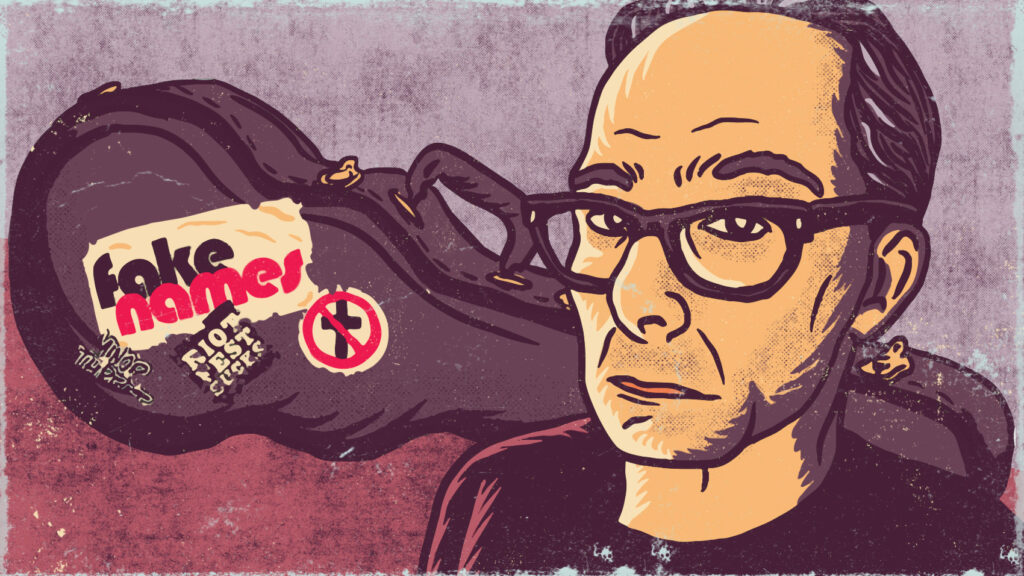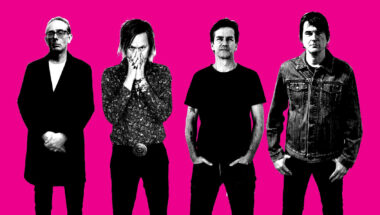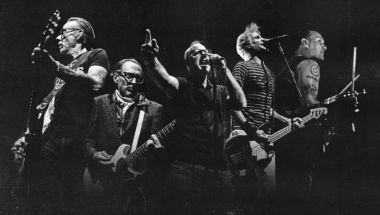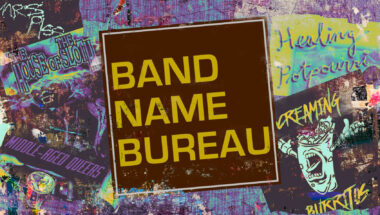If I made up a band name out of thin air, named three accomplished punk musicians, and told you that it was a new supergroup that Brian Baker started, there’s a good chance you’d be fooled.
It feels like just yesterday that I was reading about the formation of Beach Rats, Baker’s last star-studded mashup that included members from Lifetime and The Bouncing Souls. One glance at the credentials behind his new project Fake Names—Refused, S.O.A., Embrace, Girls Against Boys, and Soulside to name a few—is nearly enough to convince you that Baker’s been throwing darts at a wall of every prolific punk he can think of. His work with Minor Threat and Bad Religion is impressive enough; his revolving door of collaborators, on the other hand, is a gift that keeps on giving.
With Fake Names, what started as a fun songwriting summit between Baker and childhood friend/S.O.A. guitarist Michael Hampton in 2016 slowly but surely morphed into an album’s worth of material. It was a lax process that never abandoned Baker’s original intentions: getting together, seeing what might happen and, most importantly, getting Hampton back on the stage for the first time in decades. This laid back, unregulated approach quickly proved successful, uncovering an electric synergy between Baker and Hampton as songwriters clearly showcased on tracks like “All For Sale” and “Brick.”
Likewise, there are little to no rules on Fake Names, out May 8 on Epitaph Records. It’s just as much a collection of down-and-dirty punk riffs as it is a great assortment of catchy power pop anthems. Even better, the instrumentals laid down by three seminal D.C. punk legends are topped off with the spirited vocal work of Refused’s Dennis Lyxzén, whose staunch lyrical opposition to corporate dominance and broken capitalism makes the record all the more enticing. Lyxzén, as it turns out, wasn’t just a great pick—he was somewhat spontaneously recruited backstage at Riot Fest in 2016.
When I caught wind of the festival’s not-completely-trivial role in the band’s formation, I knew I had to hear the full story—and thankfully, neither of us were terribly busy, given the circumstances. Baker was around to tell me about how the group’s demos ended up as the final album versions, how surprisingly easy it was to get Lyxzén on board, and how Fake Names might be his first “good” band name.
RIOT FEST: I’ve listened now a couple of times to the debut Fake Names album, and I really love the balance you guys struck on this one. It feels like a tried-and-true classic punk record, but with a power pop edge that has some really cool lead guitar work.
BRIAN BAKER: Oh, that’s so kind of you. I think that’s because there’s two lead guitar players in the band and we don’t know how to shut up. [Laughs] It’s fun. No one’s really playing rhythm, so that’s why it comes off that way.
That’s you and Michael Hampton on guitars, right? Who you’ve known since first grade?
Yeah, we grew up together. Michael is the reason I went punk in 1980. He played in a number of really seminal, important DC bands—my favorite of which is Embrace, a band that he played in with Ian MacKaye after Minor Threat broke up. That is still my favorite Discord record.
I’ve always loved his playing, and we’ve remained friends over all these years, and this kind of just came out of that. Not trying to do anything, but just playing guitar together until enough songs came together. Then we were like, “Well God, we got to get a band going for this. I mean, come on. This will be fun.”
On top of that, Johnny Temple—who is also in Fake Names—went to the same elementary school as you and Michael, right?
Yes!
That is pretty wild. Were you all running around in little kid punk bands?
Well, elementary school was before punk—I realize how old we are. So, no. [Laughs] We weren’t running around in kid punk bands. The funny thing about Johnny is that I’ve known Johnny my whole life, but we didn’t really remember that Johnny was also in school with us until way after the record was done, because Johnny’s a couple of years younger than we are. When you’re in fourth grade, you don’t know who the second graders are. Like, “What are those tiny things? We’re men! we’re fourth graders!”
It’s certainly coincidental that Johnny wound up going to the same school we did. I hope our teachers are proud, if any of them are still living.
It was you and Michael though that, roughly four years ago, got together and ended up writing songs for what would become this Fake Names record. How much have those songs changed since then or over those four years?
God, I can’t believe it was that long ago. Really? Yes, I guess it is. We just had a couple of ideas. Throughout that time we had been writing more and getting together more. So the process of getting just the music together took a couple of years, because this was just sort of a… to us, we didn’t really know what this was. It was just kind of a fun project.
At that point we had our friend Matt [Schulz] playing drums for us, and we got Dennis at that Riot Fest [in 2016]. So, all of this took a long time to get into what it is. Nothing really changed, it was just about adding to it—and the only real changes happened when we finally got to a point where we felt we could record in a studio. Dennis came from Sweden and we had time to really collaborate with him, because Dennis had written all the lyrics. So that’s kind of how it all came together. But [Fake Names] was recorded like we were documenting what we were doing. We weren’t thinking about it as an album, so it’s kind of interesting.
And with Dennis, that’s the reason we’re talking today: I heard about Fake Names and saw the bit about adding Dennis to the project after seeing him with Refused at Riot Fest 2016. I’d love to hear the story behind that.
Well, Johnny and I knew Dennis—we were friendly with Dennis. I mean, all the old punk rock guys know each other, it’s just how it is. We had been thinking about singers and we didn’t really have a list, but there were a couple of people we liked and Dennis was on that list. I think Johnny had recently had some interaction with him. It was like, “Oh yeah, Dennis would be cool,” but we never really moved on that. When this Riot Fest came up, Johnny and I were there because we were playing—I’m not sure if I even knew Refused was playing. I was there with Bad Religion, and Johnny was there doing Girls Against Boys.
There’s not really a backstage at Riot Fest, it’s just kind of those trailer zones. We were at a crossroads area where you would go to where the press stuff is—people just sort of stand around there—and honestly, I was standing there with Johnny, we were talking about something, and Dennis walks up, and we’re like, “Fuck, it’s Dennis Lyxzén. Hey, what’s up bud?”
We both were excited to see him, and Johnny was like, “We should ask Dennis to sing.” I was like, “Dennis, do you want to sing for this band we’re doing?” He didn’t even go like, “Let me hear this stuff.” He goes, “Sure, that sounds fun.” He knew us, and Dennis is a huge fan of DC punk rock. It was that simple. It was just kind of this happenstance… it felt like it just went, “Oh my God, this is great,” The light bulb went on, and it was just another case—like most of my career—of being in the right place at the right time. Nothing to do with talent, just proximity.
Proximity in the back channels of the Riot Fest trailers.
Yes, exactly. [Laughs] It’s a whole different world back there, man.
People do seem to love it. Everything’s right next to the food, and bands can just have a good time in a lawn chair for most of the weekend.
It’s true. It’s another reason why I love Riot Fest—I mean, that’s part of why I play every time I’m asked. I love it. There’s a lot of festivals that don’t really get that the fun part for the band is interacting with each other, making an environment where everybody can hang out. That is what’s so much fun. There’s a lot of times you’ll see festivals where bands have their own little camps, and it’s not integrated like Riot Fest where everybody’s got the same thing. Everybody is kind of loose in that environment. How many friendships started because of that?
Right, and it’s exactly how you bumped into Dennis. How much of the album had you written before he joined?
I think we probably had half of it. The record has ten songs on it, but I think we may have written about fourteen. We probably had about six songs that we initially sent to Dennis that he did not reject. He was like, “Okay cool, this is good.” And he just started working on lyrics.
You mentioned you didn’t really know what the record actually was for a while, it was more or less just for fun. Was there a point you reached where you felt like you knew what you wanted to do with these songs—or how you wanted it to be different from your other projects?
I didn’t really think about it in that sense. What I was thinking about was writing music with Michael, who is one of my favorite guitar players. Michael is a composer, and he has not been performing live as a musician for decades. I just was thinking that the world needs to know more about Michael, honestly. So I’m like, “I would love to get Michael to come out to play, get [him] out of his fucking house.” Life is too short. I’d also recently moved to New Jersey from DC, and Michael lives in Brooklyn, so I’m right by Asbury Park—we’re so close that you can just go hang out and have lunch. So this was going to be us having this fun collaboration and seeing what comes of it.
Eventually, we had enough songs together where we said, “Well, we should probably see about recording demos of this stuff.” The recording itself is also part of the fun. We were very lucky that we have a good friend, Geoff Sanoff, who works at Renegade Studios in New York City—a studio that’s actually owned by Little Steven. Sometimes there’s downtime, and Jeff would say, “Hey, if you want to get some really cheap time, it looks like this studio is going to be empty on this Tuesday if you want to come.” So we’d take advantage of these little holes in the schedule at the studio, he gave us a really nice reduced rate, and we started making these “demos.”
We got to the point where we had 12 songs and said, “You know what would be fun? We’ll see if we can get someone who will let us make a record. Maybe we’ll use these demos and get a record out on a cool label.”Michael had some friends with different labels who seemed pretty interested, and we started looking at our options. And I said, literally, one day I was just like, “Why don’t I ask Brett [Gurewitz] what he thinks?” Because I’m on Epitaph, Brett’s label.
I sent him 10 songs, and he called me and said that he loved them, and that he would like to put this record out. And I said, “That sounds awesome. These are demos—how do you want to record them?” And he said, “No, no, no, no, these are done. This is the record. And this is the record I want to put out.” He was so excited about them, and I don’t even know if I’d sequenced them. I think I just basically put these songs in a file and sent them to him—and what you’re hearing are those “demos” that Brett liked, that’s our record. It’s really cool.
I wanted to get into the lyrics a little. Dennis Lyxzén is obviously a very political lyricist, given his work with Refused, and you hear it especially on this record. The opening track “All For Sale” doesn’t hide anything: it’s a clear-cut condemnation of capitalism, that it’s a system that doesn’t work.
Dennis is a real deal revolutionary. I mean, this guy, he’s no bullshit. I think one of the reasons why this collaboration has worked so well is that Dennis came in with these incredibly provocative and powerful lyrics—the music could have gone either way. It’s aggressive, but not in a conventional sense.
“All For Sale” is a great example of where Dennis went with this stuff. He’s tapped into the way society is divided up, which has been consistent since societies began: it’s them and us. That’s what punk rock is, and that’s what modern society is. There are people who act in self-interest, and people who act in the interest of the community. This is how it’s always been.
Right, and it feels easy enough to grasp. But there’s a surprising amount of folks who have never viewed their lives through the lens of “us and them.” It makes me wonder if these people—due our current situation and the unprecedented rate of unemployment—might ask themselves for the first time, “Is there a better system than this?”
Well, a lot of people are going to pick up on it, because it’s happened to them. I don’t want to get into any sort of political diatribe here, but historically what we’ve found is there are so many people who are willing to vote against their own self-interest for whatever reasons, be it prejudice or just low information. The only way that you’re going to make a dent with those people is when something comes and sits right down on the couch next to them—and that is this pandemic that we’re dealing with. The way it’s been handled. The way it’s being exploited and monetized at the same time. I expect it because I’m addicted to Twitter, and I read a lot, and I’m in Bad Religion.
I’m paying attention. But a lot of people who have never paid attention before now have no choice but to do so. Hopefully that is one of the benefits, if you can find benefits in this global tragedy: it’s education. So yes, fingers crossed. We’ll see what happens.
Okay, lastly: Where did the name Fake Names come from?
We were writing lists of names and I wrote down Fake Names—it was a play on fake news, which is one of my least favorite combinations of words in the world. The reason it became Fake Names is because I had recently watched Raising Arizona for maybe, I don’t know, the 50th time? It comes from when the brothers are robbing the bank: after blurting out their real names, they tried to backtrack from telling people their real names [by saying], “Ya’ll hear that? We’re using code names.”
So, honestly, that’s what it was: “Fake News, or Code Names… how about Fake Names?” It was on a list of ten ideas I emailed and everybody really liked it. It got kind of cool to me, because it had a power pop feel to it. It has kind of a late seventies style to it. It didn’t read as a play on fake news either, which was good.
Band names are so hard. I’ve been in so many bands with bad names. Like, oh, I don’t know… Minor Threat, Bad Religion. I mean, if you had told me that these bands would become somewhat significant to people… when you just look at those names written down, I mean, they’re just terrible. [Laughs] Like, you know what’s a good name? Sex Pistols. That’s a good name. You know what’s a good name? Guns N’ Roses. You know what’s not a good name? Dag Nasty. I think with Fake Names, we’ve at least started out on a better footing.
I feel like the majority of household band names were ones that very little thought was put into. You know, “Ah, we’ll just call it this.” And then you blow up, and you’re stuck with it.
[Laughs] Yeah. With Minor Threat and Bad Religion, the bands were being named by people who were 15 who were trying to play a show. You get a pass for that. Dag Nasty was the same. Who’d be talking about it in 2020? Nobody. Doesn’t matter.
Right. But flash forward all these years, and some photo of those guys on a porch drives everyone crazy.
Yeah, it’s cool. I like that. I really like that we’re all still good friends. And I also like the fact that we’re never, ever, ever playing music again. [Laughs]
The self-titled debut Fake Names is out May 8 via Epitaph Records. You can listen to the latest single “Being Them” here and preorder a copy of the record over here.



